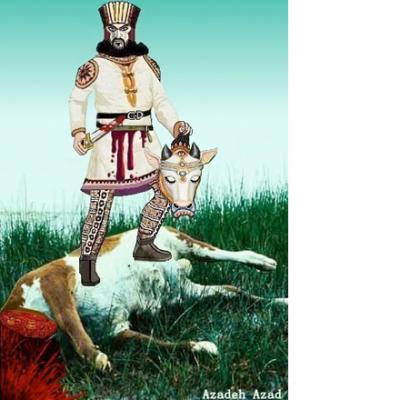به زبان فارسی
PICTORY
LATEST MUSIC
SEARCH
Mashi and Mashiana (II)
by Azadeh Azad
10-Nov-2011
This poem saw in horror
the burst of the still horizon
that shook the foundation of
Mashi and Mashiana’s shelter.
Hords of herding Fathers, armed,
on horses, blazed with energy,
galloped out of the frozen dark
edges of the northern steppes.
Prints of troopers’ heavy boots,
hooves of their horses, tales of
their fleeting tents and scythed
four-horse chariots, their ruthless
push littering their path with blood
and bones.
They conquered tamarak pastures,
mountainous lands, waves of
women and wombs, new cattle,
metals, and ways of weapon-making
on their way south, east and west.
This poem cried and cursed
on the cat-like southern plateau
as father-warriors sent one from
amongst themselves to murder the
Aryan Great-Mother, Celestial Sacred Cow,
Mother of Mithra, Anahita, Mazda
on the orders of her forceful, ingrate son
self-appointed god of gods,
Ahura-Mazad.
As the Cosmic Mother Cow rested
on her side, radiant in slumber, her shadow
where the sun buried its feet, her forehead,
a dark stage for the moon, the proxy man
did as he was told.
Thus the man became first hero, first king, first
royal/kian of the conquering Persians.
He was named Gayo Maretha,
Cow Murderer.
Gayo, gâv, kayo, cow.
Maretha, marth, mard, murderer.
Plundering Persian patriarchs
settled on the plateau, upstaged
the folktales in their own image,
celebrated Kayomarth as the first man
connected him crassly to the old tale of
creation, to the marvellous myth of
Mashi and Mashyana.
They contrived how Ahura-Mazda
created Kayomarth through the
Earth-Mother, Goddess Esphand,
before the birth of the first humans,
Mashi and Mashiana. A first man,
immortal, from god of gods before
the first couple was even made.
This poem knows the rule of fathers
comes with crazed stories, yet calculated,
crooked, conveying the worship
of the male.
Kayomarth was fashioned forth
to help Ahura-Mazda in his fight
against the Evil Spirit, Ahriman.
Kayomarth, an only man, without
a female mate, engaged in a
mainly male cosmic fight.
This poem learned Ahriman laying
down on the making of Kayomarth,
in his awe, for three-thousand years.
Till the arch-demon Whore, Jeh,
roused her father, Ahriman, from
his stupor, promised him to destroy
Kayomarth. Finally a female someone,
though from darkness in the eyes of
Ahura-Mazda. But Jeh had only talked.
It was Ahriman the father who acted,
sent Demon of Death, Astwihâd,
to assail Kayomarth with Want, Sloth,
Lust, and a thousand Diseases.
But it was to no avail as Ahura-Mazda
brought Sleep in the form of a radiant youth
over Kayomarth, and Zurvan, the sexless god
of Time and Space, parent of
Ahriman and Ahura-Mazad,
destined Kayomarth to outlive
For thirty further years.
This poem laughs
at one more fractured part of the
tale where Mazda’s parent is no more
the Goddess of Earth, but the sexless
God of Time; and the revised chronicle
of Creation continues.
In the end, in accordance with his
horoscope, Kayomarth succumbed
to his wounds and died, while his sperm
having been coined from male fire,
not from female waters, fell upon
the earth, cleansed by the rays
of the sun and received by
Goddess Esphand,
his own mother.
This poem sees
how the Earth-Mother’s golden egg
was replaced by the semen of her son
Kayomarth, which remained in the
Earth-Mother’s womb for forty years
as his « seed.»
Out of Kayomarth’s fiery seed,
not of Goddess Esphand’s watery one,
slowly grew a rhubarb plant. Oh, yes,
a plant born of fire in the reverse world
of fathers, a rhubarb plant the stem
of which divided and turned
into the first human couple,
Mashi and Mashiana.
This poem says :
«And the rest is history »
a masculine three-thousand
year-old history of hailing
semen, penis and balls
to ensure that the lie of
Phallus as the source of life’s
flow is maintained in the minds
of the masses at the expense of
the power of motherhood
feigned as a weakness.
This poem adds:
And always absurdly, Kayomarth
slept with his own daughter Mashiana,
who gave birth to dark-haired Siamak,
who was her son earlier too, but
with Mashi, not with Gayomarth.
In the age of men’s rule, Siamak
became the second King
of Persia.
This poem sighs :
Even though the basis of
Mashi and Mashiana’s shelter
is shaken, they are still asleep
in their bed, living, reliving,
the horrors that landed in
their dream on a quiet,
common evening.
© Azadeh Azad, 2011
| Recently by Azadeh Azad | Comments | Date |
|---|---|---|
پیروزی نسرین ستوده پس از ٤٩ روز اعتصاب غذا | 32 | Dec 04, 2012 |
نامه به سازمان عفو بین الملل برای آزادی نسرین ستوده | 1 | Nov 30, 2012 |
مفهوم سازی واژه گونه (۳-٩) | 1 | Nov 27, 2012 |
RECENT COMMENTS
IRANIANS OF THE DAY
| Person | About | Day |
|---|---|---|
| نسرین ستوده: زندانی روز | Dec 04 | |
| Saeed Malekpour: Prisoner of the day | Lawyer says death sentence suspended | Dec 03 |
| Majid Tavakoli: Prisoner of the day | Iterview with mother | Dec 02 |
| احسان نراقی: جامعه شناس و نویسنده ۱۳۰۵-۱۳۹۱ | Dec 02 | |
| Nasrin Sotoudeh: Prisoner of the day | 46 days on hunger strike | Dec 01 |
| Nasrin Sotoudeh: Graffiti | In Barcelona | Nov 30 |
| گوهر عشقی: مادر ستار بهشتی | Nov 30 | |
| Abdollah Momeni: Prisoner of the day | Activist denied leave and family visits for 1.5 years | Nov 30 |
| محمد کلالی: یکی از حمله کنندگان به سفارت ایران در برلین | Nov 29 | |
| Habibollah Golparipour: Prisoner of the day | Kurdish Activist on Death Row | Nov 28 |



